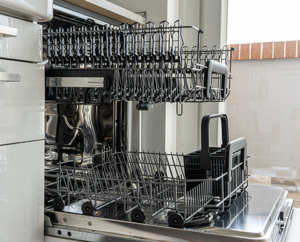Dishwashers
 How Does a Dishwasher Work?
How Does a Dishwasher Work?
Dishwashers are labor-saving and water-conserving appliances that were first invented in the U.S. in the 1850s. There are both portable units and permanently installed units that are found in most homes today.
Home Inspectors always inspect dishwashers. Permanently installed dishwashers rely on the home’s electrical and plumbing systems, which is why their proper operation and maintenance are critical to household safety and trouble-free use.
A dishwasher operates with sprayed water using multiple cycles of washing and rinsing, followed by drying, using hot, forced circulated air. These cycles may be further distinguished according to length of cycle, power and temperature.
Dishwashers are plugged into a dedicated electrical receptacle at the back of the unit, and usually plumbed into the home’s hot water supply, although the cold water supply is also an option. This assures that the dishwasher’s load is optimally washed and rinsed using the maximum recommended temperature range of between 130° F and 170° F.
The dimensions of an average unit are 24×24 inches, although deluxe models may be wider and/or deeper to accommodate larger loads. Its interior components are typically made of stainless steel and/or plastic, and the exterior door may be metal, enamel-covered metal, or having a wood or wood-like veneer to match the decor of the kitchen cabinets.
Use, Maintenance and Precautions
Dishwasher-safe glasses, cups, plates, bowls, pots, pans and utensils, as well as some ceramic-ware and cutlery, are loaded into pull-out racks and baskets. They can be safely washed and rinsed in cycles that vary in intensity and length.
Many users rinse, soak or pre-treat cookware to remove solids and excess food waste before loading it in the dishwasher; this is a matter of personal preference, as well as how well the unit works on everyday and heavy-duty loads, although waste that cannot be adequately drained should be removed from dishware before the soiled items are loaded into the unit.
Dishwashers can also be used to effectively disinfect toothbrushes, infants’ plastic toys, formula bottles and synthetic nipples, and teething rings, as well as other household and personal hygiene items. However, extremely soiled items that come into contact with potentially hazardous or toxic materials, such as tools, gardening implements and the like, should not be washed in a dishwasher, as the toxic residue may not fully rinse out of the interior, which can contaminate future loads of dishware and utensils, as well as clog plumbing lines.
Soaps, pre-treaters and rinsing agents to prevent or eliminate water spots are available in a variety of costs, quality and effectiveness. They also come in both powder and liquid form. Regardless of the type of detergent used, it should be specifically for dishwasher use only, as other soaps can leave behind residue, as well as create excess foam and leaks.
Maintenance is relatively easy and can be done by running the unit through a hot-water cycle while it is empty, but this is only suggested following an especially dirty load where residue has not fully washed and drained for some reason.
Dishwashers should never be overloaded. Loads should be distributed and racked such that cleaning will be effective. It is recommended that plastic items be loaded into the unit’s top rack to avoid their coming into contact with hot elements in the unit’s bottom and then melting, or being jostled by the power of the sprayers and subsequently blocking them, which may prevent the water from reaching the unit’s entire load.
It is important to monitor the unit for failure to fully drain, as well as for leaks, excessive noise and movement, and burning smells, which can indicate a burned-out motor, an issue with the plumbing connected to the unit, or a problem with its original installation. A qualified professional should evaluate a malfunctioning unit and perform any repairs
Home Run Inspections
405-905-9175
Info@HomeRunInspections.com
We cover all of the bases!
Serving: Oklahoma City, Edmond, Yukon, Moore, Norman, Purcell, Midwest City/Del City, Bethany, El Reno, Shawnee, Harrah, and more.
Schedule your inspections now Online at:
Follow us on
Like us on FaceBook
Follow us on Twitter
Follow us on Instagram: Instagram

